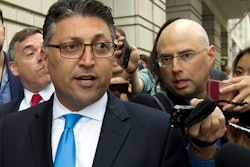Back in the late 90s and early 2000s Ericsson was one of the leading names in an emerging product category – mobile communication devices, or cell phones. This was a time before Android and Apple, so the Swedish telecom company was competing against the likes of Motorola, Nokia and Blackberry.
During this time the stakes were high, the opportunities higher, and the lay of the mobile networking land in many emerging markets resembled the Wild West. So, although the company stopped producing phones more than 15 years ago, some of those early practices apparently continued. And now they’re about to pay a heavy price for mistakes made over the last two decades.
Over the years Ericsson has transitioned to focus more on networking equipment, with its products playing a key role in the development of 5G infrastructure and the internet of things. However, since 2013 it has also been working with the U.S. Securities and Exchange Commission and the Department of Justice on an investigation dealing with kickback schemes and bribes used to secure contracts in China, Indonesia, Kuwait, Saudia Arabia, Djibouti and Vietnam.
The SEC and DOJ recently concluded the investigation and are now looking to fine Ericsson over $1.2 billion for “ethics breaches” that may have violated the Foreign Corrupt Practices Act, which lays out anti-bribery and transparent accounting guidelines. The company pre-emptively fired 50 people last year for practices that reportedly continued up until early 2017.
The investigation’s findings come at a time of transition for Ericsson, as it has been cutting costs in freeing up resources to continue its surge in the 5G market. It recently claimed to have its products deployed in about two-thirds of all current 5G networks.
Late last month the company also announced plans for a 300,000-square-foot factory outside of Dallas that will produce advanced antenna radio systems for North American customers.
While exact details of the scandal have not been made public yet, the company’s CEO, Borje Ekholm recently told Forbes that his company is “ashamed about the historical conduct”, “very unhappy”, and “sad about being in this position.”






















